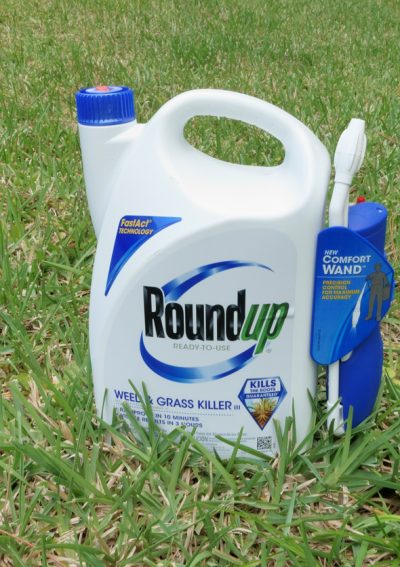Why Is Roundup Still Being Sold?
Roundup is still being sold in the U.S. despite research that suggests glyphosate is carcinogenic because the U.S. has not banned the sale of products containing glyphosate. However, Roundup lawsuits led parent company Bayer to decide to stop selling glyphosate-containing residential formulas in 2023.

Is Roundup Safe?
Research suggests that glyphosate, the active ingredient in Roundup, is likely a human carcinogen, making the herbicide potentially unsafe. However, controversy surrounding its safety continues, and the product is still widely available in the U.S. for consumer and industrial use. The U.S. Environmental Protection Agency once classified glyphosate as possibly carcinogenic but later reclassified the product as safe for humans.
Safety concerns over Roundup remain. The World Health Organization classifies glyphosate as probably carcinogenic to humans based on studies involving human herbicide exposure.
“The herbicide glyphosate … [was] classified as probably carcinogenic to humans. … The IARC Working Group … considered the significant findings from the U.S. EPA report and several more recent positive results in concluding that there is sufficient evidence of carcinogenicity in experimental animals.” – International Agency for Research on Cancer, World Health Organization
Evidence suggests that the herbicide has short- and long-term adverse health effects, with Roundup exposure symptoms that include impacts to the nervous system and non-Hodgkin’s lymphoma. Despite the evidence, the EPA maintains that glyphosate — and therefore Roundup — is “not likely to be carcinogenic to humans.”
Studies Link Glyphosate to Cancer
According to a University of Washington meta-analysis of existing research, the carcinogenic implications of glyphosate exposure are more substantial than previously indicated. Furthermore, a Swiss study confirmed that glyphosate raises the risk of non-Hodgkin’s lymphoma. Another systematic review also found that the existing evidence suggests that glyphosate exposure significantly increases the risk of NHL, further noting:
“The rise of glyphosate as the most widely used herbicide fosters serious concerns about its properties as a carcinogen and its ability to cause [Non-Hodgkin lymphoma]. … The totality of evidence from mechanistic studies in human and animal systems suggests that glyphosate and its formulations possess several of the ten key characteristics of carcinogens.” – Iemaan Rang et al., Division of Environmental Health Sciences, School of Public Health, University of California, Berkeley.
In addition to NHL, a 2022 literature review suggests that glyphosate may also increase the risk of breast cancer in humans. Overall, the most recent evidence suggests that Roundup’s links to cancer are stronger than the EPA indicates in its classification of glyphosate as not likely carcinogenic to humans.
Why Are People Still Using Roundup?
Even if Roundup may be linked to cancer, it is still on the market in the U.S. because the EPA has not changed its classification for glyphosate. According to the EPA’s information about glyphosate, Roundup is safe to use. Though some studies have shown Roundup may cause health issues, not everyone who uses Roundup will be affected.
Roundup products effectively control weeds and maintain aesthetically pleasing lawns. As long as the product remains available to purchase, consumers may continue using it. Bayer is releasing newer Roundup formulations that don’t contain glyphosate.
- The EPA still maintains that “there are no risks to human health when glyphosate is used in accordance with its current label.”
- The IARC classified glyphosate as likely carcinogenic to humans based on animal laboratory studies and human exposure research, indicating that Roundup products are unsafe for humans because they contain the chemical.
- A U.S. Court of Appeals for the Ninth Circuit 2022 decision required the EPA to conduct an interim registration risk assessment on the environmental impacts of glyphosate but determined that the agency did not need to perform such a review on the human health impacts.
Though Roundup with glyphosate is still available for commercial use, Bayer has announced that it will stop selling Roundup with glyphosate for residential use in 2023. Bayer, Roundup’s parent company, posted a negative global sales outlook for 2023, largely because of declines in the sale of products containing glyphosate.
When Will Roundup Be Banned?
The timing for a Roundup ban in the U.S. is uncertain as legislation struggles to gain wide acceptance. However, Congressional proposals continue, including the Protect America’s Children from Toxic Pesticides Act from U.S. Representative Jim McGovern that seeks to ban 70 pesticides, some already forbidden in other countries.
Bayer’s lobbying efforts are considerable, creating roadblocks and stalling efforts to ban Roundup in the U.S. and blocking a ban on Roundup in Thailand. However, individual states in the U.S., some countries and the European Union are evaluating their approvals for glyphosate, creating an uncertain future for Roundup.
Bayer To Remove Glyphosate From Residential Roundup
While the likelihood of a ban on glyphosate in the U.S. is unclear, Roundup cancer lawsuits against Bayer have caused the company to take action by removing glyphosate from products used in home lawns and gardens. This action is not because of any acknowledgment of the product’s harmful effects but solely to avoid future litigation, according to the company’s “Five-Point Plan to Close the Roundup Litigation” announced in May 2021.
“...the company and its partners will replace its glyphosate-based products in the U.S. residential Lawn & Garden market with new formulations that rely on alternative active ingredients beginning in 2023, subject to a timely review by the U.S. Environmental Protection Agency (EPA) and state counterparts.” – Bayer Statement, July 29, 2021
As of October 2023, Roundup products containing glyphosate are still widely available online and in brick-and-mortar stores from retailers such as Lowe’s, Tractor Supply, Walmart, Ace Hardware, Home Depot and Amazon. Bayer is also prepared to mitigate the damages through Roundup lawsuit settlements.
What Should I Do With My Roundup?
Consumers who have unused Roundup products they wish to get rid of need to follow guidelines for disposal. Despite the EPA’s classification of Roundup as a safe product for household and industrial use, it is hazardous. Household product disposal may differ from industrial product disposal.
- Read the product label for guidelines for the safe disposal of unused products.
- Contact the state EPA or public health department for recommended and required hazardous waste disposal procedures.
- Contact the local residential waste management authority to determine whether it has a hazardous waste disposal program.
- Do not pour unwanted Roundup down the sink, toilet, sewer or street drain, most wastewater treatment facilities do not remove all pesticides from the water supply during treatment.
- Don’t reuse empty Roundup containers because residues can contaminate the new contents.
Getting rid of unwanted Roundup requires care to reduce the likelihood of toxins entering the environment, potentially creating additional human and ecological hazards. However, every state has its own guidelines for disposing of household hazardous waste.
The EPA suggests contacting the local waste management authorities or contacting Earth 911 at 1-800-CLEANUP or earth911.com.
What Can I Use Instead of Roundup?
Alternatives to Roundup provide a safe and effective means of maintaining lawns and gardens. These products may utilize acetic acid, iron or essential oils to help keep weeds and pests under control.
- Avenger
- BurnOut II
- Fiesta
- Homemade vinegar, salt and dish soap solution
- Iron-X
- Phydura
- Scythe
In addition to alternative applications, consumers can implement other measures to control weeds. Mechanical methods include manually pulling weeds or using a flame-weeding machine. Those living on larger properties can consider keeping goats or geese. Finally, planting native ground cover and grasses generally creates an environment less friendly to weeds than turf grass.
12 Cited Research Articles
Consumernotice.org adheres to the highest ethical standards for content production and references only credible sources of information, including government reports, interviews with experts, highly regarded nonprofit organizations, peer-reviewed journals, court records and academic organizations. You can learn more about our dedication to relevance, accuracy and transparency by reading our editorial policy.
- Bayer. (2023, November 9). Five-Point Plan to Close the Roundup Litigation. Retrieved from https://www.bayer.com/en/roundup-litigation-five-point-plan
- USEPA. (2023, September 11). Glyphosate. Retrieved from https://www.epa.gov/ingredients-used-pesticide-products/glyphosate
- Bayer. (2023, July 23). Bayer lowers full-year outlook. Retrieved from https://www.bayer.com/media/en-us/bayer-lowers-full-year-outlook/
- Rana, I. et al. (2023, July 18). Mapping the key characteristics of carcinogens for glyphosate and its formulations: A systematic review. Retrieved from https://www.sciencedirect.com/science/article/pii/S0045653523018398
- Hardell, L. et al. (2023, March 20). Exposure to phenoxyacetic acids and glyphosate as risk factors for non-Hodgkin lymphoma – pooled analysis of three Swedish case-control studies including the sub-type hairy cell leukemia. Retrieved from https://www.tandfonline.com/doi/full/10.1080/10428194.2023.2190434?needAccess=true
- GovInfo. (2023, February 23). S. 269 (IS) - Protect America's Children from Toxic Pesticides Act. Retrieved from https://www.govinfo.gov/app/details/BILLS-118s269is
- USEPA. (2022, September 21). Withdrawal of the Glyphosate Interim Registration Review Decision. Retrieved from https://www.regulations.gov/document/EPA-HQ-OPP-2009-0361-14447
- Bukowska, B. et al. (2022, August 27). Glyphosate disturbs various epigenetic processes in vitro and in vivo – A mini review. Retrieved from https://www.sciencedirect.com/science/article/pii/S004896972205358X
- Costas-Ferreira, C., R. Duran and L.R.F. Faro, (2022, March 22). Toxic Effects of Glyphosate on the Nervous System: A Systematic Review. Retrieved from https://www.mdpi.com/1422-0067/23/9/4605
- Bayer. (2021, July 29). Bayer Provides Update on Path to Closure of Roundup™ Litigation. Retrieved from https://www.bayer.com/media/en-us/bayer-provides-update-on-path-to-closure-of-rounduptm-litigation/
- Zhang, L. et al. (2019, February 10). Exposure to glyphosate-based herbicides and risk for non-Hodgkin lymphoma: A meta-analysis and supporting evidence. Retrieved from https://www.sciencedirect.com/science/article/abs/pii/S1383574218300887
- IARC. (2015, March 20). IARC Monographs Volume 112: evaluation of five organophosphate insecticides and herbicides. Retrieved from https://www.iarc.who.int/wp-content/uploads/2018/07/MonographVolume112-1.pdf
Calling this number connects you with a Consumer Notice, LLC representative. We will direct you to one of our trusted legal partners for a free case review.
Consumer Notice, LLC's trusted legal partners support the organization's mission to keep people safe from dangerous drugs and medical devices. For more information, visit our partners page.
855-605-1792
